 Every day when my students enter the classroom, they have a set of 5 warm-up problems awaiting them. The first 5-10 minutes of each class period are spent working on these problems, checking them, and getting some mini-lessons in along the way.
Every day when my students enter the classroom, they have a set of 5 warm-up problems awaiting them. The first 5-10 minutes of each class period are spent working on these problems, checking them, and getting some mini-lessons in along the way.
There are a number of important reasons that I love to start out each math class period with warm-ups. In this post I will share with you how I use warm-ups, why I like them so much, my student work expectations, and the strong impact that I believe warm-ups have had on my state test results. I will also explain the system I use to implement my warm-up program.
Setting the Tone for a Productive Class Period
When my students enter the room the 5 warm-up problems are projected on the screen in the front of my room. I have trained my students to quiet down when the bell rings, copy down their homework assignment, and then begin their warm-up problems.
I have a “points person” who will add or subtract classroom points each day at the beginning and end of the period. Students receive class points at the beginning of the period if they stop talking and start working on their practice problems. I tell them that my goal is not to speak for the first two minutes of the period. During that time, as the students are working, I take attendance and prepare any materials I might need for my lesson.
The sense of calm that pervades the room (most of the time :) is wonderful! I dislike starting each class period by asking students to quiet down, take out their warm-ups, and copy down their homework. It feels like babysitting to me. I spend time establishing routines at the beginning of the year and that time comes back to me in a big way during the course of the year.
Checking the Warm-Ups
After about 5 minutes have passed we check the exercises that have been completed. I select a student and give them 6 tickets to distribute – 5 for the students that correctly answer and explain the warm-up problems and 1 for the ticket passer. Students receiving a ticket (from a basic roll of tickets that I purchase from Staples), put their name on the back and place the ticket in a class-specific can at the back of the classroom. Every 3-4 weeks I hold ticket drawings where I select 10-20 tickets and give away treats, school passes, homework passes, and any other prizes I can get my hands on. I mention this at Back-to-School Night and parents will often donate gift cards or other items.
As we review the math problems I often teach small mini-lessons. We discuss any problems that are previews of lessons that have not yet been taught. Most of the problems have been taught in some way prior to the warm-ups but I don’t mind a quick lesson for the new problem types. I realize that the short explanation will not be grasped by every student but a number of students will understand it and be prepared for a similar problem in the future.
Warm-Up Corrections
Students do the warm-up problems in pencil and correct them in colored pencil or ink. I provide them with a recording sheet where they show work for each problem and place the answers in the answer column. (Click here to download my warm-up recording sheet. Note: The first two lines in each section are for the day and date.)
As we correct and discuss the problems students are instructed to show the work in color next to each problem that they have missed. When I grade these practice problem sets I give full credit for missed problems that have been corrected. (Trying to encourage learning here, ya know!)
The Benefits of Spiral Review
A few years ago I was involved in a discussion with my principal about how we could improve student test scores. I told her that to me this was NOT a mystery. If students were given the opportunity to practice the key skills in their grade level a number of times during the year, their retention and ability to use these concepts would dramatically increase. My principal then informed me that we had purchased a set of Pre-Algebra warm-ups that would help accomplish this task.
Too often (before I used warm-ups) students were taught grade level skills during the year and then we held about a 3-5 day “cram session” where we reviewed the most important skills again before our state tests. This proved not nearly as effective as the daily warm-up problems. These problems often expose students to the key grade level concepts 5-10 times (or more) during the course of the school year. The results were noteworthy.
The Results of Using Daily Warm-ups in the Math Classroom
The year we adopted the Pre-Algebra warm-up program we were only able to complete 50-60 of the daily warm-ups because we started a few months into the school year. Still, our 7th grade state test results showed the biggest increase out of any subject and grade level in our school. While my conclusion is based solely on observation (and I know that there are other factors involved) my colleagues and I are certain that repeated exposures to the key content standards in 7th grade made a significant difference in our results.
The following year our 6th grade team (I teach both grade levels) created our own set of warm-ups because a commercial product like the one we used in 7th grade was not available to us. We experienced similar results of significant improvement by our 6th grade students on the state mathematics test that year.
To me it is simply common sense that students will better understand Pythagorean Theorem, exponent operations, the properties of numbers, and many other topics when they are given multiple opportunities to learn each concept that are spread throughout the year.
What About the Common Core State Standards?
With nearly every state having adopted the new Common Core State Standards for Mathematics, how will skill-based warm-ups fit in with these new standards? Although my district is still in the beginning stages of implementation of the CCSS, my sense is that students will always need a strong skill set in order to approach the problem solving tasks that are part of the Common Core.
I plan on either searching out or creating my own warm-up program to both implement and help support the Common Core State Standards. (Note: Since I wrote this post I have created my own Common Core Warm-Up Programs. Click on the following links to see the 6th Grade Math Common Core Warm-Up Program or the 7th Grade Math Common Core Warm-Up Program.) You can view and print preview pages, full teacher directions, and even try some sample warm-ups in your classroom.
In addition, every 3-4 weeks or so I replace my regular warmup program with one of my Speed Skills Challenge modules. This is a way for students to strengthen a particular skill over a 5-day series of speed drills.
Please Share with the DigitalLesson.com Community of Math Teachers
I would love to have you share with the DigitalLesson.com community any thoughts you have regarding warm-ups. Do you use warm-ups? What programs have you seen related to the Common Core? Please share your expertise and experiences with us below.
Your first comment is moderated to prevent spam. Additional comments on DigitalLesson.com will show up in real time. Thanks!
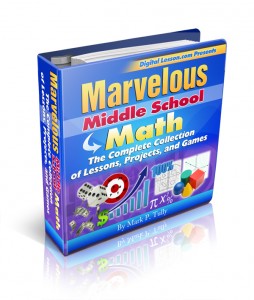
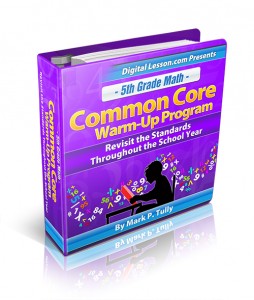
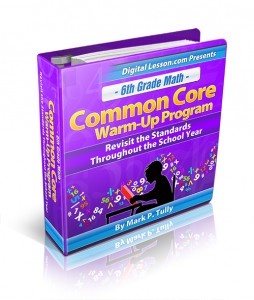
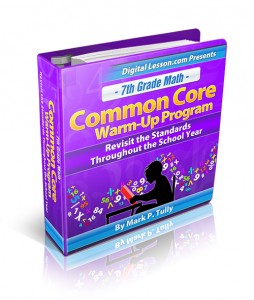
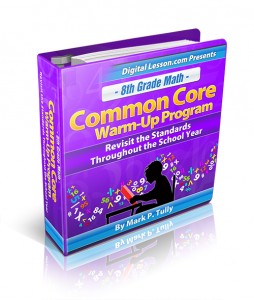


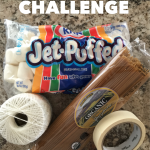

Speak Your Mind